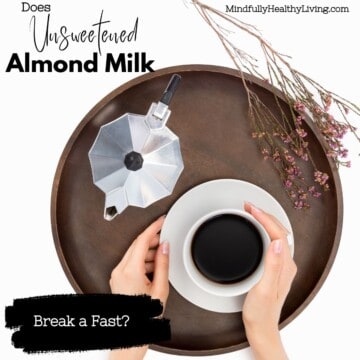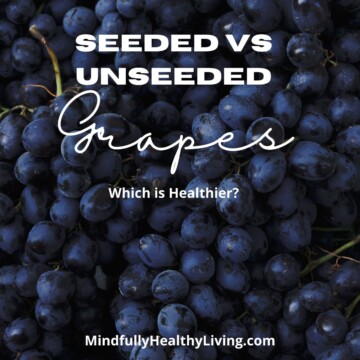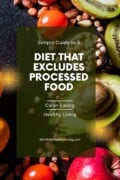In today's fast-paced world, where convenience often dictates our dietary choices, it's time to reconsider how we nourish our bodies. With the increasing prevalence of health issues linked to processed food consumption, adopting a diet that excludes processed food has become a crucial step toward health and well-being.
As a holistic nutrition coach, I am passionate about guiding you through a simple and practical approach to embracing a wholesome diet that prioritizes whole foods and unprocessed ingredients.
You can embark on a transformative journey toward a healthier and more vibrant life by making conscious choices to exclude ultra-processed foods and incorporate nutrient-dense foods.
Let me be honest. When I first learned what processed food was, I was shocked. I went through a whole grieving process. Everything I thought I knew about food was wrong. It felt overwhelming.
I had no idea what I was doing before I was taught and coached through the process. Even after several years, I am still learning new things about certain foods and how they affect our bodies. This is entirely normal.
However, with each step that I take, I discover more incredible benefits of clean eating and natural living. And it just keeps getting easier- plus it's totally worth it.
From mental health and clarity to eliminating pain and even lessening the frequency and severity of colds, these important shifts in my life have made a monumentally positive impact on my and my family's lives.
Throughout this article, we will explore the detrimental impact of highly processed foods on our health, understanding why it's essential to exclude them from our diets. We will uncover the benefits of embracing whole, unprocessed foods and how they can nourish our bodies from within.
Together, we will dive into a beginner's guide that will empower you to make informed choices, develop sustainable eating habits, and create delicious meals that celebrate the natural flavors and nourishing properties of unprocessed ingredients. Get ready to revitalize your health and discover the joys of a balanced diet that harmonizes with your body's needs.
Embrace the Journey Towards Wholesome Nourishment
Embarking on a diet that excludes processed foods is not just a temporary fix; it's a lifelong commitment to nurturing your body, mind, and spirit. Through this blog series,
I aim to empower you with the knowledge, inspiration, and tools necessary to make informed dietary choices that align with your holistic wellness goals.
Are you ready to reclaim your health, boost your vitality, and embrace a diet that celebrates the beauty of whole, unprocessed foods? Join me in this transformative journey as we unlock the secrets to nourishing our bodies and unlocking our full potential.
Stay tuned for the upcoming articles, where we'll dive deeper into the practical steps you can take to transition to a diet that excludes processed foods while embracing a vibrant and nourishing lifestyle.
What is Processed Food?
Processed food refers to any food item that has undergone various manufacturing processes to alter its original form or extend its shelf life. These processes typically involve the use of additives, preservatives, artificial flavors, and colors, chemically altered vegetable oils, and higher sugar contents. Additionally, processing methods may include canning, freezing, dehydrating, refining, or packaging.

Processed foods can range from simple items like canned vegetables and frozen fruits to more complex products such as packaged snacks, sugary beverages, ready-to-eat meals, and fast food. These foods often undergo significant modifications from their natural state, resulting in a loss of nutritional value while introducing harmful ingredients.
It's important to note that not all processed foods are inherently unhealthy. Some minimally processed foods, like pre-cut organic vegetables or packaged organic ancient whole grains, can still be part of a healthy diet.
However, it is the highly processed foods, such as highly sugar-sweetened beverages, unhealthy fats, and excessive sodium, that are generally associated with negative health effects when consumed in excess.
In recent decades, the food industry has created increasing amounts of convenience foods that are highly processed and harmful to our health. We have just now been seeing the results of decades of modern diets (or Standard American Diets) that are filled with unnatural and harmful ingredients and growing methods.
Processed foods often undergo refining processes that remove essential nutrients like dietary fibers, vitamins, and minerals, leaving behind primarily empty calories. Furthermore, these foods are designed to be hyper-palatable, often containing high levels of sugar, salt, and artificial additives to enhance taste and prolong shelf life.
In recent decades, the food industry has created increasing amounts of cheap convenience foods that are highly processed and harmful to our health. It is appealing due to its ease of use and attractive price points.
However, we have just now been seeing the results of decades of eating the type of food in this modern diet (or Standard American Diet). The rise in processed foods has been paralleled by a rise in chronic conditions, and weight gain that contributes to challenging health problems for all ages.
By understanding the nature of processed foods and their impact on our health, we can make more informed choices and prioritize whole, unprocessed (or less-processed foods) that support our overall health and well-being.
Effects of Processed Food on Health
The consumption of processed foods has been associated with a range of detrimental effects on our health. Here are some key ways in which processed food can impact our well-being:
Nutritional Deficiencies: Processing methods often strip away vital nutrients, such as fiber, vitamins, and minerals, from the original food source. This can lead to nutritional deficiencies, hindering our body's ability to function optimally and increasing the risk of chronic diseases.
Weight Gain and Obesity: Processed foods tend to be calorie-dense while lacking essential vitamins and nutrients. They are often high in added sugars, unhealthy fats, and refined carbohydrates. Regular consumption of these foods can contribute to weight gain and obesity, as well as related health issues like insulin resistance and metabolic disorders.
Increased Risk of Chronic Diseases: Processed foods are frequently linked to an increased risk of chronic diseases. Excessive intake of added sugars, unhealthy fats, and sodium can raise blood pressure, elevate cholesterol levels, and contribute to the development of cardiovascular disease, including heart disease, high blood pressure, and stroke.
Moreover, diets high in processed foods have been associated with an increased risk of type 2 diabetes and certain types of cancer. Check out our Anti-Cancer Diet and Meal Plan here.
Poor Digestive Health: Many processed foods lack fiber, which plays a crucial role in maintaining a healthy digestive system. Insufficient fiber intake can lead to constipation, impaired digestion, and an imbalance in gut bacteria, negatively impacting our overall digestive health.
Inflammation and Immune Function: Some additives and artificial ingredients found in processed foods have been linked to increased inflammation in the body. Chronic inflammation is associated with a variety of health conditions, including autoimmune disorders, allergies, and an impaired immune system.
Impact on Mental Health: Emerging research suggests that a diet high in processed foods may contribute to poor mental health outcomes. Studies have found associations between processed food consumption and an increased risk of depression, anxiety, and cognitive decline.
It's important to note that the occasional consumption of processed foods is not likely to cause immediate harm.
However, relying on them as the foundation of our diets can have cumulative negative effects on our health over time. By reducing processed food and fast food intake and prioritizing whole, unprocessed alternatives, we can support our overall well-being and decrease the risk of chronic diseases.
In the next section, we will explore the benefits of excluding processed foods from our diets and embracing a more wholesome approach to eating.
Health Benefits of Eating More Natural Food
Embracing a diet that prioritizes natural, unprocessed foods offers a multitude of benefits for our overall health and well-being. Here are some key advantages:
Nutrient Density: Natural foods, such as fresh fruit, vegetables, whole grains, nuts, seeds, and lean proteins, are rich in important nutrients like vitamins, minerals, antioxidants, and dietary fiber. These nutrients are vital for supporting optimal bodily functions, boosting the immune system, promoting healthy digestion, and providing long-lasting energy.
Reduced Chemical Exposure: By opting for natural foods, we can minimize our exposure to artificial additives, preservatives, and pesticides that contribute to our body's toxic load commonly found in processed foods. Choosing organic or locally sourced options can further reduce our intake of harmful chemicals, promoting a cleaner and more sustainable diet.
Weight Management: Natural foods are often lower in calories, added sugars, and unhealthy fats compared to processed counterparts. They are also typically higher in fiber and water content, which can increase satiety and help manage weight by promoting feelings of fullness and reducing overeating.
Improved Digestive Health: Whole, unprocessed foods are excellent sources of dietary fiber, which plays a crucial role in maintaining a healthy digestive system. Adequate fiber intake supports regular bowel movements, prevents constipation, and nourishes beneficial gut bacteria, promoting a balanced gut microbiome. Try our mucoid plaque cleanse here.
Enhanced Heart Health: Natural and whole foods do not have harmful hydrogenated oils and trans fats. They also tend to be rich in heart-healthy nutrients like omega-3 fatty acids, antioxidants, and soluble fiber, which can help lower blood pressure and cholesterol levels and reduce the risk of cardiovascular diseases, including heart attacks and strokes.
Reduced Inflammation: Many natural foods possess anti-inflammatory properties due to their high content of antioxidants, phytochemicals, and omega-3 fatty acids. By incorporating these foods into our diet, we can help lower chronic inflammation in the body, which is associated with various health conditions like arthritis, diabetes, and certain cancers.
Mental and Emotional Well-being: A diet rich in whole foods has been linked to improved mental health outcomes, including reduced risk of depression, anxiety, and cognitive decline. The nutrients found in natural foods, such as omega-3 fatty acids, B vitamins, and antioxidants, can support brain health, mood regulation, and cognitive function.
Sustainable and Environmentally Friendly: Choosing natural, unprocessed foods often aligns with a more sustainable and environmentally conscious lifestyle. By opting for locally sourced, organic, and seasonal produce, we can reduce our carbon footprint and support sustainable farming practices.
By embracing a diet that focuses on natural, unprocessed foods, we can nourish our bodies, support our health, and experience the full spectrum of flavors and benefits that whole foods have to offer. In the following sections, we will explore practical tips and strategies to help you transition to a diet that excludes processed foods while incorporating more natural, wholesome options into your daily meals.
Step-by-Step Guide to Transition to Clean Eating
Transitioning to a clean eating lifestyle involves making conscious choices to prioritize whole, unprocessed foods and eliminate or minimize processed and artificial ingredients from your diet. Here is a step-by-step guide to help you make a smooth and sustainable transition:

Educate Yourself: Take the time to learn about the benefits of clean eating and the risks of processed foods. Understand the impact of different food groups on your health and well-being. This knowledge will motivate and guide you throughout your transition. Follow us on MindfullyHealthyLiving.com and subscribe to receive emails for exclusive up-to-date wellness info! We are also on Facebook, Instagram, Pinterest, and TikTok!
Assess Your Current Diet: Evaluate your current eating habits and identify the processed foods that are most prevalent in your diet. This will help you pinpoint areas for improvement and set realistic goals for change. Consider adding Liver Cleanse Juice or Anti-Inflammatory Juice Shot.
Set Clear Goals: Define your goals for transitioning to clean eating. Determine what changes you want to make, such as reducing added sugars, eliminating artificial additives, or increasing your intake of fruits and vegetables. Start with small, achievable goals and gradually build upon them.
Clean Out Your Pantry: This is a very important first step! Go through your pantry, refrigerator, and freezer to identify processed foods and remove them from your home. Discard items that are highly processed, high in added sugars, unhealthy fats, and artificial ingredients. Replace them with organic and whole food alternatives, such as fresh produce, whole grains, and minimally processed options.
Plan Your Meals: Meal planning is key to successfully healthy and clean eating. Plan your meals and snacks for the week, ensuring they consist of whole, nutrient-dense ingredients. Include a variety of fruits, vegetables, lean proteins, whole grains, and healthy fats. Prepare a shopping list based on your meal plan to avoid impulse purchases of processed foods.
Shop Mindfully: When grocery shopping, focus on the perimeter of the store where fresh produce, meats, and dairy products are usually located. Fill your cart with whole foods and minimize the time spent in the processed food aisles.
Read food labels carefully, avoiding products with lengthy ingredient lists or artificial additives. If you aren't sure about an ingredient, google the health effects of (fill in the ingredient name).
Please note that some popular conventional sites will claim an ingredient is safe because it has been recognized as safe by our food governing agencies in the US. However, oftentimes the same ingredients that are allowed in the States aren't in other countries!
Cook from Scratch: Embrace the joy of cooking and prepare meals from scratch using fresh ingredients. Experiment with new recipes that incorporate whole foods and explore different cooking methods to enhance flavors naturally. Get creative with herbs, spices, and homemade sauces to add depth and variety to your dishes.
Embrace Whole Snacks: Replace processed snacks with whole food alternatives. Opt for fresh fruit, raw nuts, and seeds, homemade energy balls, or vegetable sticks with hummus. Prepare snacks in advance to have them readily available when cravings strike.
Stay Hydrated: Drink plenty of water throughout the day to stay hydrated. Avoid sugary beverages, including sodas and fruit juices. Opt for herbal teas or infuse water with fresh fruits and herbs for a refreshing and flavorful option.
Practice Mindful Eating: Slow down and savor each bite. Practice mindful eating by paying attention to the flavors, textures, and sensations of the food. Listen to your body's hunger and fullness cues, and eat until you feel satisfied rather than overeating. Pay attention to how you feel after each meal. If you get a headache or feel extra achy the next day, consider the food may be a trigger.
Plan Ahead: Eat out less. However, If you are going to a restaurant, choose one that prioritizes whole and minimally processed foods. If you cannot find a healthy restaurant, try to choose something on the menu that is primarily whole food like meat and vegetables. Sometimes we can't always eat perfectly, but we can make the best choice available.
Seek Support: Surround yourself with like-minded individuals who are also on a clean eating journey. Seek support from friends, family, or online communities like our page to share experiences, recipes, and tips. Having a support system can provide motivation and accountability.
Remember, transitioning to clean eating is a gradual process, and it's normal to have occasional slip-ups. Be patient and kind to yourself as you make changes, and celebrate your progress along the way. With time, clean eating will become a natural and sustainable way of nourishing your body and embracing a healthier lifestyle.
Dietary Options: Exploring Various Approaches to Clean Eating
When it comes to clean eating, there are several dietary options to consider, each with its own unique approach and focus. Let's explore some of the popular dietary choices and their key characteristics, including a plant-based diet, vegan diet, vegetarian diet, paleo diet, carnivore diet, climatarian diet, ketogenic diet, and the role of animal products.
Plant-Based Diet: A plant-based diet emphasizes whole, minimally processed foods derived from plants, such as fruits, vegetables, whole grains, legumes, nuts, and seeds. It places a strong emphasis on consuming plant sources for nutrients while minimizing or eliminating animal products. When done properly and without processed foods, this approach is believed to provide a wide range of health benefits, including increased fiber intake, reduced risk of chronic diseases, and improved environmental sustainability.
Vegan Diet: A vegan diet takes plant-based eating a step further by eliminating all animal products, including meat, poultry, fish, dairy, eggs, and even honey. Vegans rely solely on plant-based foods for their nutritional needs, ensuring they obtain essential nutrients like protein, calcium, iron, and vitamin B12 from plant-based sources or fortified products. Veganism extends beyond diet to embrace a lifestyle that avoids the use of animal-derived products in other areas of life as well.
Vegetarian Diet: Vegetarian diets exclude meat but may include other animal-derived products like dairy and eggs. There are different types of vegetarian diets, including Lacto-vegetarian (includes dairy but excludes eggs), ovo-vegetarian (includes eggs but excludes dairy), and lacto-ovo vegetarian (includes both dairy and eggs). Vegetarian diets can be nutritionally balanced when they incorporate a variety of plant-based foods to meet nutrient needs.
Paleo Diet: The paleo (or "caveman") diet aims to mimic the dietary patterns of our hunter-gatherer ancestors. It focuses on whole, unprocessed foods that would have been available in the Paleolithic era, such as lean meats, fish, fruits, vegetables, nuts, and seeds. The diet excludes processed foods, grains, legumes, dairy products, and added sugars. The emphasis is on consuming nutrient-dense foods and avoiding processed and refined ingredients.
Carnivore Diet: The carnivore diet is a highly restrictive diet that emphasizes the consumption of animal products, such as meat, poultry, fish, and animal fats while excluding all plant-based foods. Advocates of this diet believe that animal products provide all the necessary nutrients for optimal health. It is important to discuss any dietary change with a qualified healthcare professional before implementing it.
Climatarian Diet: The climatarian diet focuses on making food choices that have a lower carbon footprint, aiming to reduce the environmental impact of food production. It encourages consuming locally sourced, seasonal, and sustainably produced foods while minimizing the consumption of resource-intensive foods, such as meat and highly processed products. The climatarian diet aims to support sustainable agriculture and mitigate climate change through individual dietary choices.
Ketogenic Diet: The ketogenic diet is a high-fat, low-carbohydrate diet that aims to shift the body into a state of ketosis, where it primarily burns fat for fuel instead of carbohydrates. It typically involves consuming foods rich in healthy fats, moderate amounts of protein, and very low carbohydrate intake. The ketogenic diet has gained popularity for its potential benefits in weight loss, blood sugar regulation, and certain neurological conditions, but it may not be suitable for everyone and requires careful consideration of nutrient balance. Check out our guide to a clean keto diet here! It has a helpful 7 day meal plan!
Role of Animal Products: Different dietary approaches vary in their inclusion or exclusion of animal protein products. While plant-based, vegan, and vegetarian diets eliminate or minimize animal product consumption, other diets, such as the paleo and carnivore diets, prioritize animal-based foods. It is important to note that the ethical, environmental, and health considerations associated with consuming animal products vary among individuals, and personal values and beliefs can influence dietary choices.
When choosing a dietary approach, it is crucial to consider personal preferences, nutritional needs, ethical considerations, and long-term sustainability. Consulting with a healthcare professional or registered dietitian can provide personalized guidance and support in selecting the dietary approach that aligns best with your health goals and values. Remember, adopting a clean eating lifestyle is about making informed choices that prioritize whole, unprocessed foods while considering your individual needs and beliefs.
List of Foods to Add and Foods to Subtract
When shifting to a clean eating diet, it is important to be aware of the foods that cause problems (ultra-processed foods) and foods that add value (superfoods). Here is a short list of the foods in these two categories, plus a free printable to help you while shopping!
Foods to Incorporate:
- Fruits (e.g., berries, apples, oranges, bananas, etc.)
- Vegetables (e.g., leafy greens, broccoli, cauliflower, carrots, etc.) Dont like vegetables? start by juicing them! Add one fruit and several vegetables to reap the benefits. Try our colon cleanse juice- its so delicious!
- Whole Grains (e.g., quinoa, brown rice, oats, whole wheat bread, etc.)
- Legumes (e.g., chickpeas, lentils, black beans, etc.)
- Nuts and Seeds (e.g., almonds, walnuts, chia seeds, flaxseeds, etc.)
- Lean Proteins (e.g., chicken breast, turkey, tofu, tempeh, fish, etc.)
- Healthy Fats (e.g., avocado, olive oil, coconut oil, nuts, seeds, nut butters, etc.)
- Dairy or Dairy Alternatives (e.g., Greek yogurt, almond milk, coconut milk, etc.)
- Herbs and Spices (e.g., basil, turmeric, maca, garlic, cinnamon, etc.)
- Water and Herbal Teas (e.g., green tea, chamomile tea, etc.)
- Natural Sweeteners (e.g. Maple Syrup, Dates, Raw Honey, Agave Nectar, Monk Fruit, Stevia)
Foods to Avoid/Minimize:
- Processed Meats (e.g., cured pepperoni, bacon, sausage, deli meats, etc.)
- Highly Processed Snacks and Treats (e.g., chips, cookies, candy, etc.)
- Sugary Beverages (e.g., soda, sweetened juices, energy drinks, etc.)
- Refined Grains (e.g., white bread, white rice, pastries, etc.)
- Added Sugars and Artificial Sweeteners (e.g., table sugar, high fructose corn syrup, aspartame, etc.)
- Trans Fats and Hydrogenated Oils (e.g., seed oils, margarine, fried foods, packaged baked goods, etc.)
- Artificial Additives and Preservatives (e.g., food coloring, MSG, artificial flavors, etc.)
- Excessive Sodium (e.g., processed soups, canned vegetables, processed snacks, etc.)
- Alcohol (limit consumption and choose in moderation, if desired)
- Non-nutritive beverages (e.g., sugary sodas, energy drinks, etc.)
Remember, this chart is a general guideline, and individual needs and preferences may vary. It's essential to listen to your body and make choices that align with your health goals and dietary requirements. Use this chart as a starting point to plan meals and make informed decisions when grocery shopping, gradually incorporating more of the "Foods to Incorporate" while minimizing the "Foods to Avoid/Minimize" for a clean, unprocessed eating approach.
[Unprocessed vs Processed Foods List]
Feel free to print and use this chart as a helpful reference when transitioning to a clean, unprocessed diet.
Conclusion
We hope this guide to a clean, unprocessed diet has provided you with valuable insights and inspiration to embark on your own journey toward a healthier lifestyle. Remember, clean eating is not about perfection but rather making conscious choices to prioritize whole, nourishing foods. If you have any questions or would like further guidance, we are here to help! Have you started on your processed-free diet and lifestyle? Let us know how it's going in the comments below!
Don't forget to explore our website for more articles, tips, and resources on holistic nutrition and wellness. Connect with us on social media to join our community and stay updated with the latest content. And if you want to receive regular updates and exclusive content, be sure to subscribe to our newsletter. Thank you for joining us on this transformative path towards clean eating and improved well-being. Here's to a vibrant and nourished life!
Have a healthy day!
Natalie







Dennis says
Wow, this is incredible information! I'm going to share this with all my friends. Too many of are suffering from problems that a could be solved with our diets.
Natalie Perry says
thank you for sharing! Sadly, this is so true.
Gloria says
With the cost of food these days, it is getting harder to eat a healthy diet. Processed foods are ok in moderation. Hopefully, this article will help people eat less of it.
Natalie Perry says
I understand. It takes some adjustment and learning new ways of cooking and eating. Its a process, but we are here to help simplify things. We believe that the investment in quality food is worth it in the long run to avoid excessive medical bills down the road. And yes, I agree, moderation is key for many things!
Tina says
Thanks for this simple guide about processed foods! I love that you broke down different aspects of why we should avoid processed foods.
Natalie Perry says
We are glad to help!
Jerika says
Yay! I really need this one because recently I've been undergoing some health issues and it involves me avoiding processed foods. So this simple guide to a diet that excludes processed food is really helpful for me and to my family. Thank you!:)
Natalie Perry says
We are so happy to hear this is helping you and your family!
Kate says
Wow, this is loaded with amazing information. Definitely going to make some changes in my own diet. Thanks for sharing. 😍
Natalie Perry says
You are welcome!